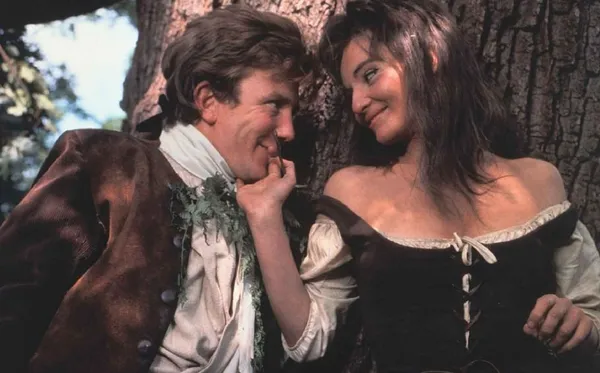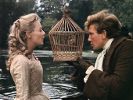Eye For Film >> Movies >> Tom Jones (1963) Film Review

They don't make costume dramas like this any more, which is an odd way of saying that Tony Richardson's 55-year-old adaptation of Henry Fielding's 18th century romp, scripted by John Osborne, was after its time. Compared to the carefully choreographed, beautifully photographed vintage dramas, as seen on TV these days, Tom Jones looks ragged, raucous and homegrown.
In the early Sixties when the class system was suffering from an artistic attack from the unwashed masses and traditional norms were being tossed overboard, accompanied by howls of derision, it began to look like Cole Porter was onto something with Anything Goes, despite freedom of expression which had nothing to do with good grammar.

In the spirit of the times and a gentle nod in the direction of La Nouvelle Vague and Dick Lester, Tom Jones, with Albert Finney, the working class hero of Saturday Night and Sunday Morning, in the saddle, opened to a sound like thunder, except it wasn't thunder, it was laughter.
Richardson was part of what they called the kitchen sink revolution at the Royal Court Theatre in London, followed by Woodfall Films for which he made Look Back In Anger, A Taste Of Honey and The Loneliness Of The Long Distance Runner, all gritty black-and-white gut wrenchers that gave a voice to reform schools, unmarried mothers and Osborne's alter ego, Jimmy Porter.
Tom Jones comes from a different stable, it seems - expensive, colour, historical satire. Fielding's tongue was firmly lodged in the side pockets of his face when he wrote the novel and all Richardson had to do was take a cue from the master and push it even further over the edge, replacing the polish expected from Jane Austin adaptations and the Downtons of today with roaring drunken landowners and wenches of every hue undressing in the undergrowth. Well... only one drunken squire (hilarious performance from Hugh Griffith) and one gamekeeper's daughter (Diane Cilento giving a lesson in rustic sex appeal).
It starts with a foundling, a baby, discovered in Squire Allworthy's (George Devine) bed. They name him Tom Jones and treat him as one of theirs. He grows up into a country gentleman (of sorts), good with horses, good with shotguns, better with ladies, especially in the bracken. He falls in love with the drunken squire's daughter (Susannah York) which proves a problem because of his disputed heritage.
The film races along with an air of tumultuous enjoyment. Scenes are either long (hunting), sensual (food), perfectly timed (Edith Evans) or messy (every tavern). There are no cliches, only original chaos. As a sex comedy it stands alone. As a game of chance it risks everything and wins.
Richardson retains Fielding's style without exaggerating the flaws of the rural rich, who are silly enough on their own. Tom's bedroom manners are flawless. He's what every woman wants and who is he to disappoint? Of course others are envious and plot his downfall.
Will love conquer all? Can Tom be saved from the gallows? Did Richardson make a better film after this?
Reviewed on: 31 Aug 2018

















